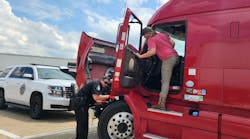WEST MEMPHIS, Arkansas—International Roadcheck often is described as a safety “blitz,” a word I always considered to be mere marketing buzz until I visited the Riverside weigh station outside of Memphis, where I saw a solid stream of tractor-trailers rolling through the scales, brakes hissing, the sound bouncing off pavement like waves of summer heat.
The section of Interstate 40 cutting through Memphis and its suburbs is among the busiest freight corridors in the country, notorious among truckers and other motorists. Every day, 50,000 vehicles cross the Hernando de Soto bridge connecting Tennessee and Arkansas across the Mississippi River. A 2021 shutdown of the bridge cost the freight industry $2 million per day, per an Arkansas Trucking Association estimate. With construction on I-55 near Memphis projected to continue until 2026, congestion has heightened as yet more traffic is diverted to I-40, according to Arkansas Highway Police Lt. F. Caballero.
“In a year you’ll probably have close to a million trucks through this weigh station,” he said.
“You’re going to have about four people per shift here, so that’s 12 officers in total,” Caballero said when tallying inspecting officers. “So 48 to 50 inspections in a 24-hour period. And it may possibly be even more.”
Caballero said staffing is now more manageable than it has been the past few years, but the situation is still not ideal, as the Riverside weigh station used to operate 24 hours a day, but is now open only 16 hours, with officers making sure to catch peak traffic between 7 a.m. and 7 p.m., according to Caballero.
“We’ve had this facility running 24/7 for years,” he said, “but manpower’s gotten down. Hiring freezes, budget concerns, people retiring—that’s brought our numbers down a little bit.
“I could probably use, to run my other facilities in my area, another 15 officers.”
Cargo securement, ABS scrutinized during Roadcheck 2023
Each year’s Roadcheck has a different emphasis, and 2023’s event has inspectors focusing on anti-lock braking systems (ABS) and cargo securement—music to Caballero’s ears.
“We’ve had a lot of crashes that have occurred because of cargo shifting affecting the maneuverability, where he probably would have had ample time to come to a stop and maneuver around a vehicle, but the shifting of the load caused him to go the opposite direction he was trying to go.”
See also: States with the most fatal truck crashes
When I think cargo securement, I think of flatbeds and straps. The lieutenant, however, emphasized the importance of cargo securement not only for flatbeds, but also for dry vans, citing a Saturday incident requiring a hazmat team when, after a load shifted and a trailer full of organic peroxide overturned, traffic shut down for over four hours.
Anti-lock braking systems are “probably not checked as often as they should be,” Caballero said, though he conceded that inspectors cannot do much roadside other than ensure that ABS indication lights are working properly. A common flaw with ABS, he said, is that older trailers do not always properly communicate with modern tractors, which leads to the systems not engaging.
Pre- and post-trip inspections: Avoid common mistakes
Although Roadcheck 2023 emphasizes these two freight-hauling factors, the Level I inspections still encompasses the entire tractor-trailer. When citing reasons for the annual event, the Commercial Vehicle Safety Alliance cites highlighting the importance of pre- and post-trip inspections at the top of the list.
Owner-operator James Reed, who has been trucking for 21 years, agreed with CVSA’s sentiment, saying his meticulous pre-trips have ensured his equipment functions well, resulting in an accident-free career.
“If you do it the right way every time, you’re less likely to have any major issues,” he said when asked if he had advice for younger drivers.
See also: Safety vs. profits: The harsh realities of the modern truck inspection mindset
Caballero listed some commonly overlooked pre-trip items. Many drivers, he said, will have an underinflated tire on the inside dual, as they might only check the exterior. Loose lug nuts on the wheels, even if they appear tightened, are another common issue.
“A lot of drivers just do a visual inspection. We don’t tell drivers they have to put their hands on everything, but that’s what we do—every lug nut.”
Caballero said he has heard drivers pass the buck when an issue is found, such as when a mechanic told the driver spare tires were secured to the rack when they were not. Yet this is not, he said, an excuse for a lazy or absent pre-trip.
“I’m not telling you not to trust people, but it is solely your responsibility.”
Lighting issues are also common, he said. Often something as simple as a bumpy road can knock cables loose and deactivate trailer lights, which is not something he holds against the driver. But the lieutenant recommended drivers, especially those who frequently drop and hook trailers, be aware that the pigtail—the cable that powers trailer lights from the tractor—will wear over time.
Enforcing the law, enforcing safety, encouraging communication
Though it’s not a CVSA-stated goal of the program, a byproduct of Roadcheck is that it builds inroads between the industry and law enforcement over the 72-hour period as thousands of officers speak to thousands of drivers nationwide. Some of those avenues of communication are rockier than others, Caballero admitted.
“Some people don’t like what we’re out here doing,” he said. “Some appreciate it.”
One inspector, Officer J. Henson, said carriers will often call him after one of their drivers fails an inspection, asking details on what went wrong and what can be done to prevent future occurrences—which he encourages.
“I’d rather take the time to talk to them upfront than them have a problem down the road,” Henson said.
See also: Product Spotlight: The latest in fleet safety technology
For carriers who want to work more closely with police, Caballero echoed what I’ve always heard law enforcement say: “Just reach out.”
“Going on now as we speak, we’re doing what’s called an outreach program. We’re going out to a lot of our local carriers, getting with them, asking if they need any guidance. We’ve had a few respond: ‘Yeah, talk to our drivers about how to do a better pre-trip,’” Caballero said.
There have been safety gains over the years due to an increased focus on safety culture throughout the industry, with Caballero noting, “Over the years, the numbers of CMV accidents we’ve seen in this area, I’d say they’ve decreased.”
Veteran drivers offer advices for rookies' first Roadcheck
Irked by, yet understanding of, the wait as an officer surveyed his truck, James Reed conveyed advice for new drivers facing inspections.
For those wanting to avoid the wait of a Level I inspection—save for those randomly chosen—make sure your logs are perfect. Reed boasted that inspectors had called his paperwork "the best they'd seen all day."
“If your paperwork and logs are not right, that’s going to make them check everything else, because they’re going to feel like, if you don’t care about that, then there’s everything else you don’t even care about.”
Reed also warned company drivers who might become lax with their paperwork that, although safety enforcers might go to the carrier with grievances, your name is still on it.
“The DOT people,” Reed said, “they’re looking at that—your name on it. … That’s on you.”
Reed, who was hauling from Savannah, Georgia, to Colorado, also advised to know the regulations of each state as you cross borders, particularly with load capacity.
Another driver, George Tacu of Phoenix-based Connect Express, has driven for almost ten years, and urged younger drivers to focus on professionalism above all else, and the money will come.
“Stop thinking about money. Start thinking about how to do your job,” he said.
“It’s not just sit and drive,” Tacu said.









